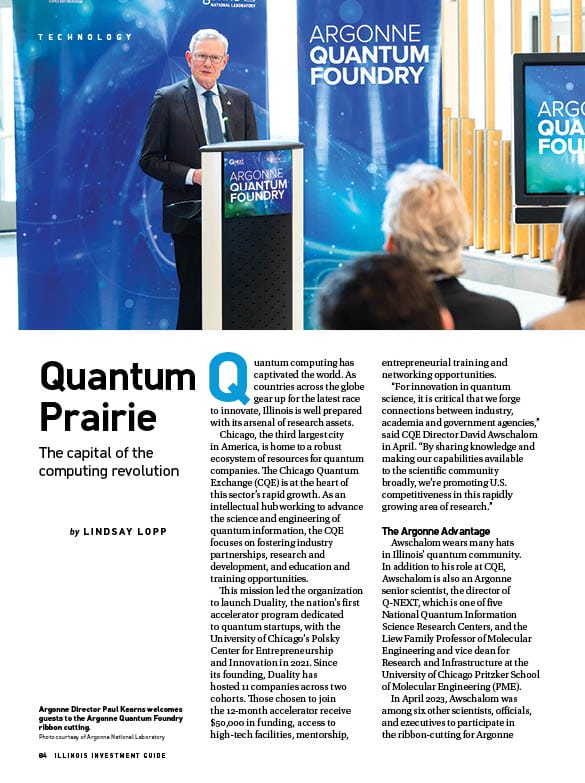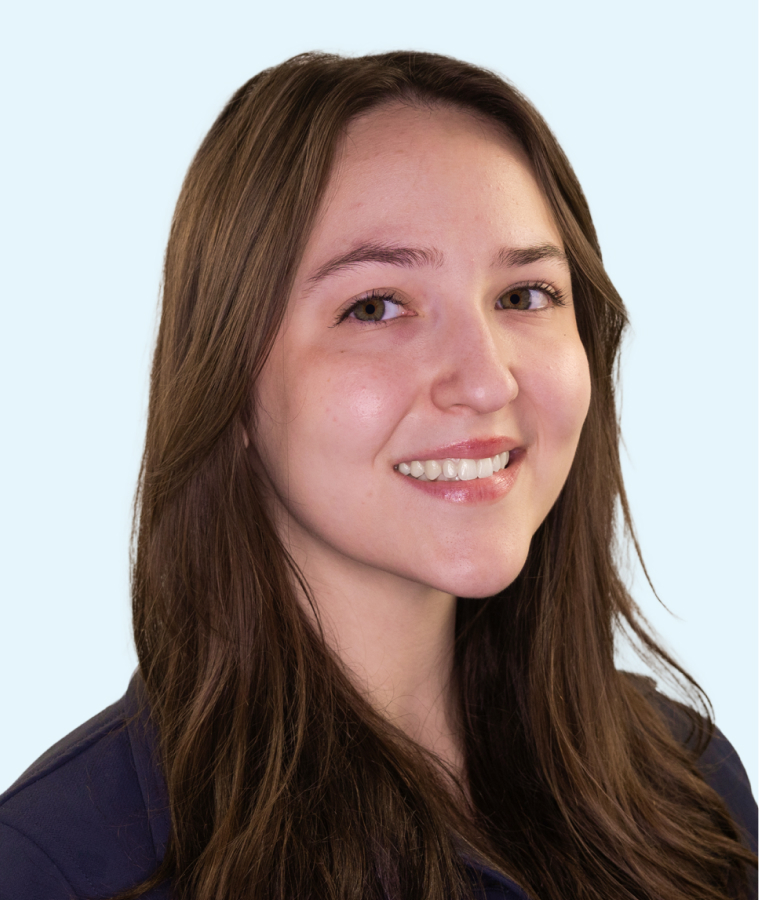Quantum computing has captivated the world. As countries across the globe gear up for the latest race to innovate, Illinois is well prepared with its arsenal of research assets.
Chicago, the third largest city in America, is home to a robust ecosystem of resources for quantum companies. The Chicago Quantum Exchange (CQE) is at the heart of this sector’s rapid growth. As an intellectual hub working to advance the science and engineering of quantum information, the CQE focuses on fostering industry partnerships, research and development, and education and training opportunities.
This mission led the organization to launch Duality, the nation’s first accelerator program dedicated to quantum startups, with the University of Chicago’s Polsky Center for Entrepreneurship and Innovation in 2021. Since its founding, Duality has hosted 11 companies across two cohorts. Those chosen to join the 12-month accelerator receive $50,000 in funding, access to high-tech facilities, mentorship, entrepreneurial training and networking opportunities.
“For innovation in quantum science, it is critical that we forge connections between industry, academia and government agencies,” said CQE Director David Awschalom in April. “By sharing knowledge and making our capabilities available to the scientific community broadly, we’re promoting U.S. competitiveness in this rapidly growing area of research.”
The Argonne Advantage
Awschalom wears many hats in Illinois’ quantum community. In addition to his role at CQE, Awschalom is also an Argonne senior scientist, the director of Q-NEXT, which is one of five National Quantum Information Science Research Centers, and the Liew Family Professor of Molecular Engineering and vice dean for Research and Infrastructure at the University of Chicago Pritzker School of Molecular Engineering (PME).
In April 2023, Awschalom was among six other scientists, officials, and executives to participate in the ribbon-cutting for Argonne National Laboratory’s latest expansion, the Argonne Quantum Foundry. The 6,000-sq.-ft. research facility is a unique asset in the Midwest and will serve as a national source of materials and data to accelerate quantum research and technological development.
“There are few places in the country dedicated to creating high-quality, standardized materials for quantum technologies, and we are pleased that one of them is now here at Argonne,” said Awschalom.
Through this expansion, Argonne will provide a national need, a domestic supply chain of materials, primarily semiconducting devices, for foundational science and industry research. The foundry features facilities for developing, testing and fabricating semiconduction qubits. Another asset this new location boasts is a silicon-based quantum computer prototype, which is designed to run simulations that aid in material development. With the data researchers collect, the foundry plans to establish a national database cataloging materials and their properties.
“Our foundry will spur advances to quantum information science and technology for the benefit of the nation,” said Argonne Director Paul Kearns in a press release . “With this world-class facility, Argonne is empowering quantum research to maintain U.S. scientific leadership and economic competitiveness.”
Teeming with Tech
Long before Chicago attracted attention for its quantum network, the city had a reputation as a world-class tech center. More than 11,200 tech companies, including industry big names such as Salesforce, Lyft and LinkedIn, run operations in the Windy City.
“With this world-class facility, Argonne is empowering quantum research to maintain U.S. scientific leadership and economic competitiveness.”
— Paul Kearns, Director, Argonne.
According to CompTIA’s 2022 State of the Tech Workforce Report, around 245,000 Chicagoans are employed by tech companies. In 2022, this city’s net tech employment grew by 3,468, a 1.4% increase.
Google currently employs more than 1,800 Chicago-based employees at its two-building campus in Fulton Market. The multinational technology corporation established its first Chicago office in 2000 with only two employees.
In the 23 years since the company opened in Illinois, Google has yet to slow down. In July 2022, it announced plans to expand into the Central Loop district. Alongside its existing facilities, Google now owns the James R. Thompson Center (JRTC) after purchasing it for $105 million. Set to undergo exterior and interior renovations, Google and JRTC Holdings, LLC, have entered a build-to-suit agreement and expect the redevelopment to be completed by 2026.
The acquired property previously served as a secondary capital for the State of Illinois and housed offices for the state government. It is the only building in Chicago where six L train lines converge, connecting the city’s South, West and North side. With this infrastructure, Google is eager to provide its employees with “unparalleled public transit access” for their commute.
“With one of the top locations in downtown Chicago, we knew after the planned renovation that the iconic building would attract world-class tenants,” said Michael W. Reschke, manager of JRTC Holdings, LLC. “These transactions are transformative for the State and the City and will create key anchors for the future success of Chicago’s downtown district and LaSalle Street for many more generations.”

